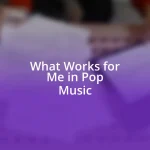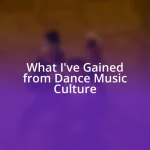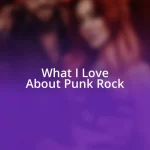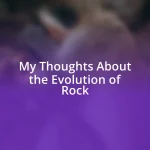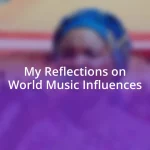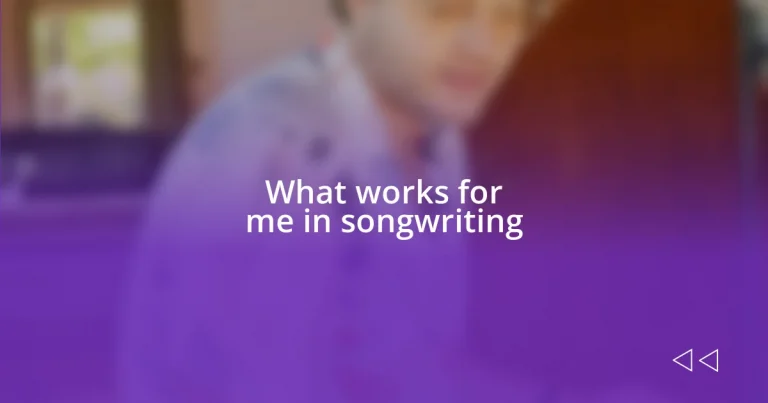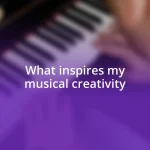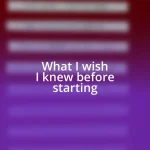Key takeaways:
- Emotional honesty and personal storytelling resonate deeply with listeners, making vulnerability a powerful tool in songwriting.
- Establishing a routine, recognizing emotional triggers, and experimenting with different techniques can enhance creativity and inspiration.
- Collaborating with others and seeking constructive feedback is crucial for refining and improving songs, fostering growth in the songwriting process.
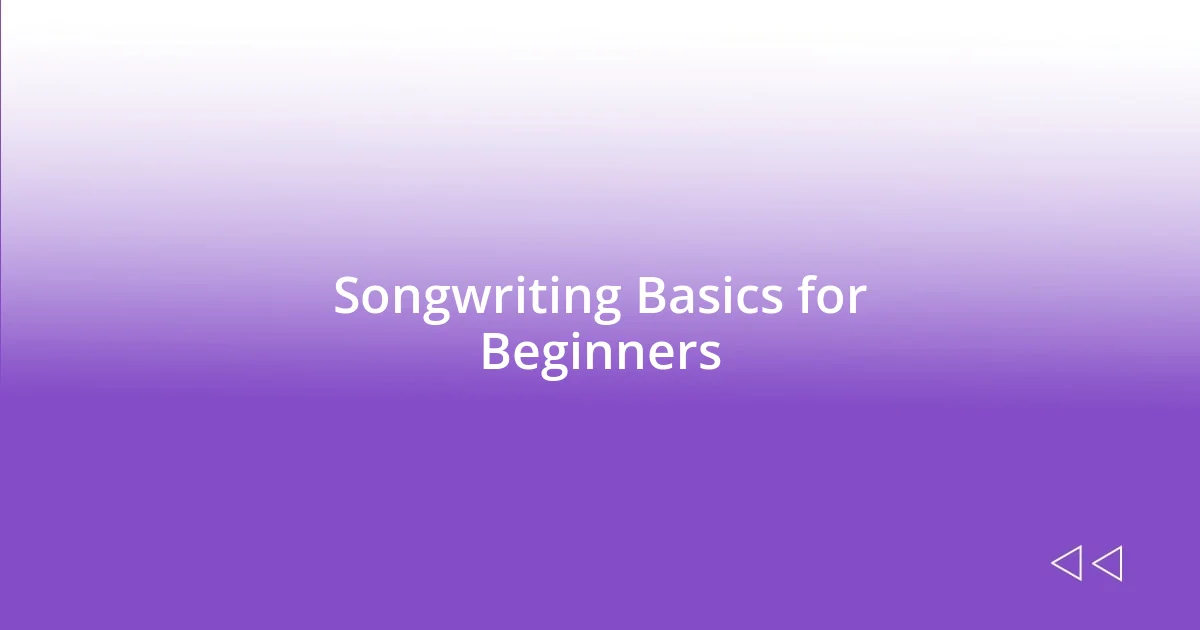
Songwriting Basics for Beginners
When I first started songwriting, I found that the simplest ideas often led to the most profound songs. I remember sitting on my porch, pen in hand, and the line “What if the stars could talk?” popped into my head. That single thought sparked a whole narrative, reminding me that inspiration can come from the most ordinary moments if we just take the time to notice them.
One crucial basic for any beginner is to understand song structure. Typically, a song has verses, a chorus, and sometimes a bridge. However, I like to think of these as puzzle pieces; they can fit together differently depending on the story I want to tell. Have you ever noticed how a song can change your mood in just a few notes? That’s the magic of structure, and it’s worth experimenting with until you discover what resonates with you.
Emotional honesty is another cornerstone of songwriting. In my experience, the songs that connect most with listeners are the ones where I’m truly vulnerable. Have you ever shared a personal experience in a song? It’s liberating! I once wrote a ballad about heartbreak that I performed at an open mic night. The response was overwhelming, and it reminded me how powerful it is to share what’s real; it’s a conversation with the audience, allowing them into your world.
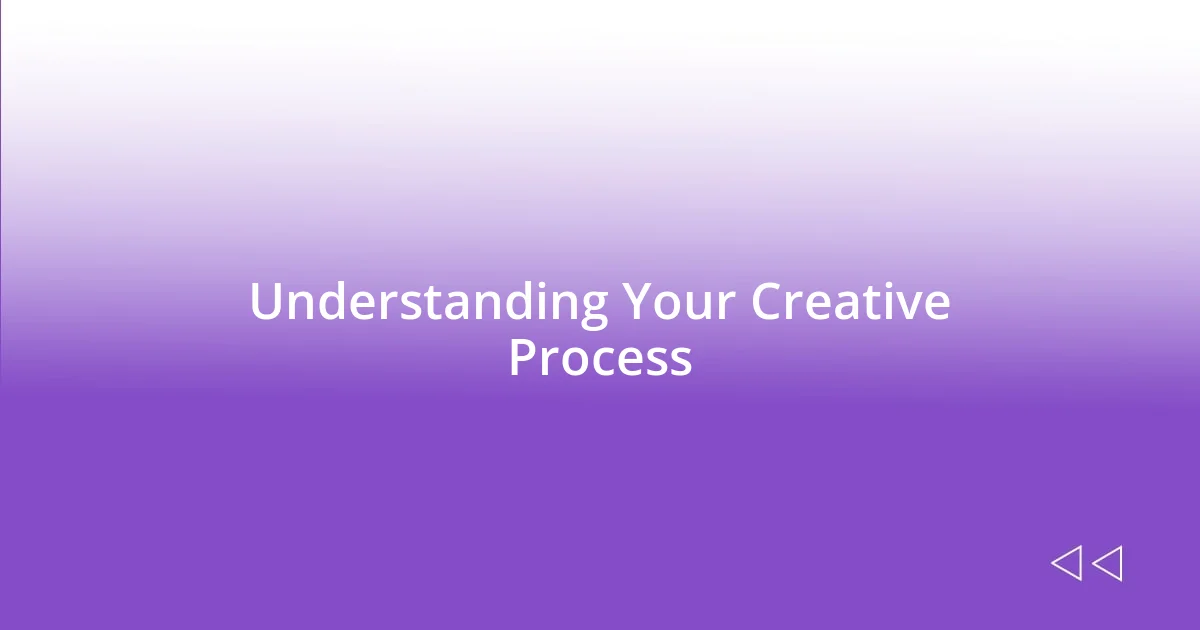
Understanding Your Creative Process
Understanding one’s creative process is essential in crafting authentic songs. I’ve found that routine plays a crucial role; for me, early mornings are the most productive. The stillness of the world allows thoughts to flow freely without distractions. Have you ever tried a consistent time for songwriting? I did this for a month, and it truly changed how I approached my creativity.
Another aspect of understanding my creative process is recognizing my emotional triggers. One day, after a particularly vibrant conversation with a friend about dreams and aspirations, I felt an indescribable rush of inspiration. I dashed to my notebook and wrote down everything I could remember. That experience taught me that sometimes, the best ideas come from genuine human interactions. Have you ever received inspiration from an unexpected conversation?
Finally, I’ve realized that experimentation is key. I often switch up genres or instruments when writing new material. Once, I grabbed a ukulele instead of my usual guitar and ended up with a playful song that surprised me. Trying new things keeps the creative juices flowing and reminds me that the process should be fun. What new techniques have you experimented with that surprised you?
| Creative Process Element | My Experience |
|---|---|
| Routine | Writing in the mornings enhances my focus and creativity. |
| Emotional Triggers | Inspired by conversations, I find deep emotional material. |
| Experimentation | Switching instruments or genres leads to unexpected creativity. |
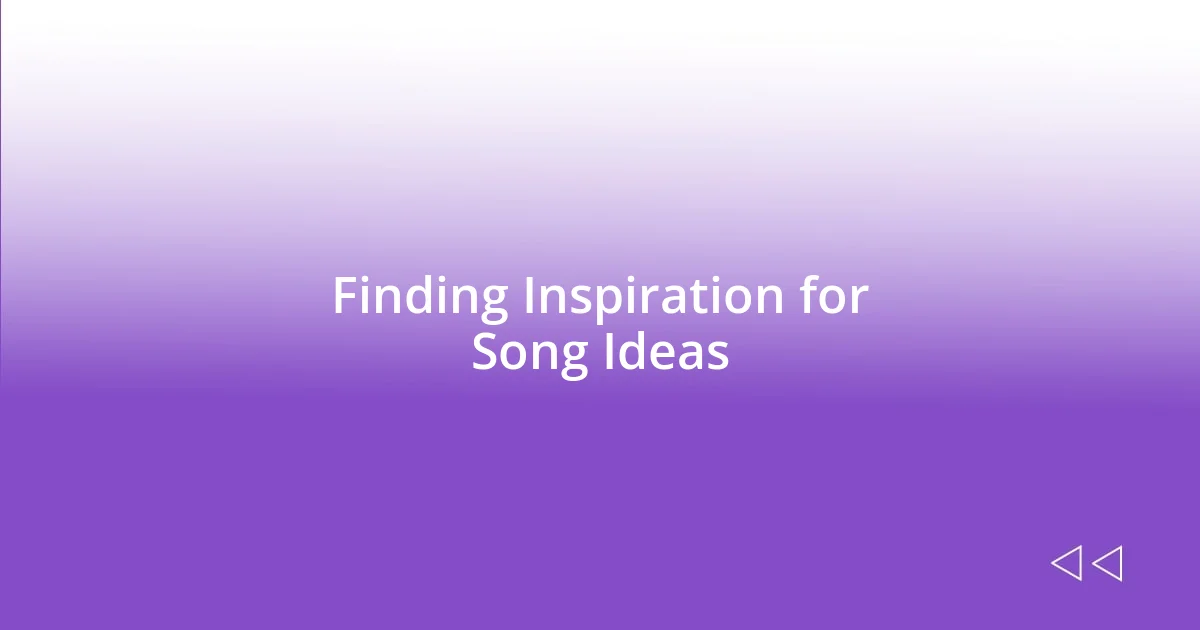
Finding Inspiration for Song Ideas
Finding inspiration for song ideas often feels like capturing fleeting moments. I remember a time when I was at the beach, watching the waves crash against the shore. The repetitive sound of the ocean sparked a song concept about life’s ebb and flow, reminiscent of how we all face ups and downs. Sometimes, stepping outside and connecting with nature opens doors to creativity; have you ever noticed how a breathtaking sunset can ignite a melody in your mind?
Here are some of my go-to sources for inspiration:
- Nature: Whether it’s a rainstorm or a mountain peak, the beauty and chaos of nature can evoke deep emotions.
- Everyday Situations: Mundane moments, like waiting in line or cooking dinner, can provide relatable lyrics.
- Art: A compelling painting or captivating film often inspires me to weave a narrative into a song.
- Dreams: I’ve woken up from vivid dreams with entire verses in my head. Keeping a dream journal can be a goldmine.
- Conversations: Engaging with friends can naturally lead to thoughtful themes and fresh perspectives for songwriting.
Engaging in spontaneous moments, like playing guitar at a park, I’ve stumbled upon riffs that turned into full-fledged songs. I once played for an audience of strangers, and one person shared their life story that deeply resonated with me. That exchange led to a heartfelt song that was born out of a connection, reminding me that our interactions can birth profound ideas. Have you ever found a song idea through a chance encounter?
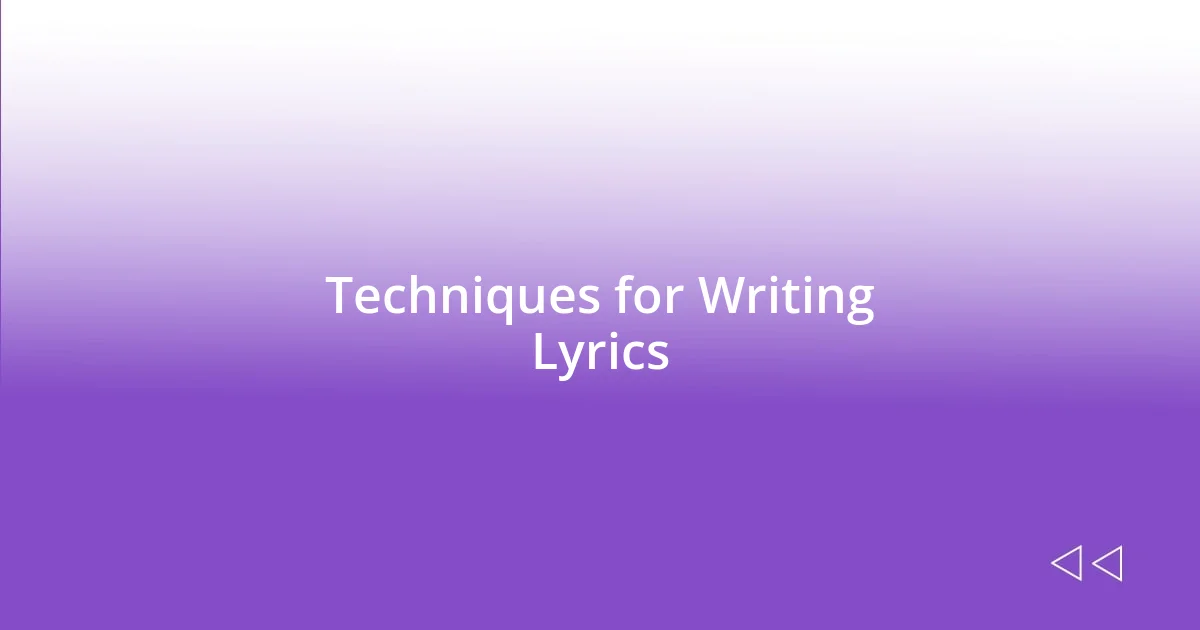
Techniques for Writing Lyrics
One technique that truly enhances my lyric writing is the use of imagery. I vividly recall a moment when I walked through a vibrant autumn park, and the falling leaves painted a picture that eventually made its way into my lyrics. Imagining the crunching sound of leaves underfoot not only set the mood, but also helped convey the feeling of transition and nostalgia in my song. Have you experimented with using imagery in your lyrics?
Another method I’ve found effective is storytelling. I often draw from personal experiences to create narratives that others can relate to. For instance, I once wrote a song based on a breakup, weaving in details of shared memories—like late-night drives and favorite songs. This approach allowed listeners to see themselves in my story, connecting on a deeper level. When was the last time you told a story through your lyrics?
Lastly, utilizing repetition can be incredibly powerful in songwriting. I learned this while crafting a chorus for a song about resilience. Repeating key phrases not only creates a catchy hook but also emphasizes the emotional weight of the message. I remember my fingers automatically tapping to the beat as I sang the same line over and over, each repetition deepening the connection to the lyrics. Have you noticed how certain refrains stick in your head and enhance the song’s impact?

Melodic Structures to Consider
When it comes to melodic structures, I can’t emphasize enough how much I appreciate the simplicity of a verse-chorus-verse format. For me, this approachable structure allows a natural ebb and flow in the song, creating anticipation with every transition. I recall writing a catchy tune where the infectious chorus lifted everyone’s spirits, making it a crowd favorite at open mic nights. Have you experienced that exhilarating moment when your audience sings along?
Another structure worth considering is the bridge. This is typically where the song takes an unexpected turn, often leading to a deeper emotional connection. A few months ago, I crafted a song that had a stark bridge contrasting with the upbeat verses. When I played it, I saw how the change resonated with listeners, drawing them deeper into the narrative. Can you think of a song where the bridge left a lasting impression on you?
Lastly, I find experimenting with non-traditional structures invigorating. One time, I wrote a song that started with the chorus, flipping the usual format upside down. This created an immediate hook, making listeners curious about where the story would lead. It felt refreshing to break the mold and explore different paths in songwriting. What’s the most unconventional song structure you’ve tried, and how did it affect the final piece?
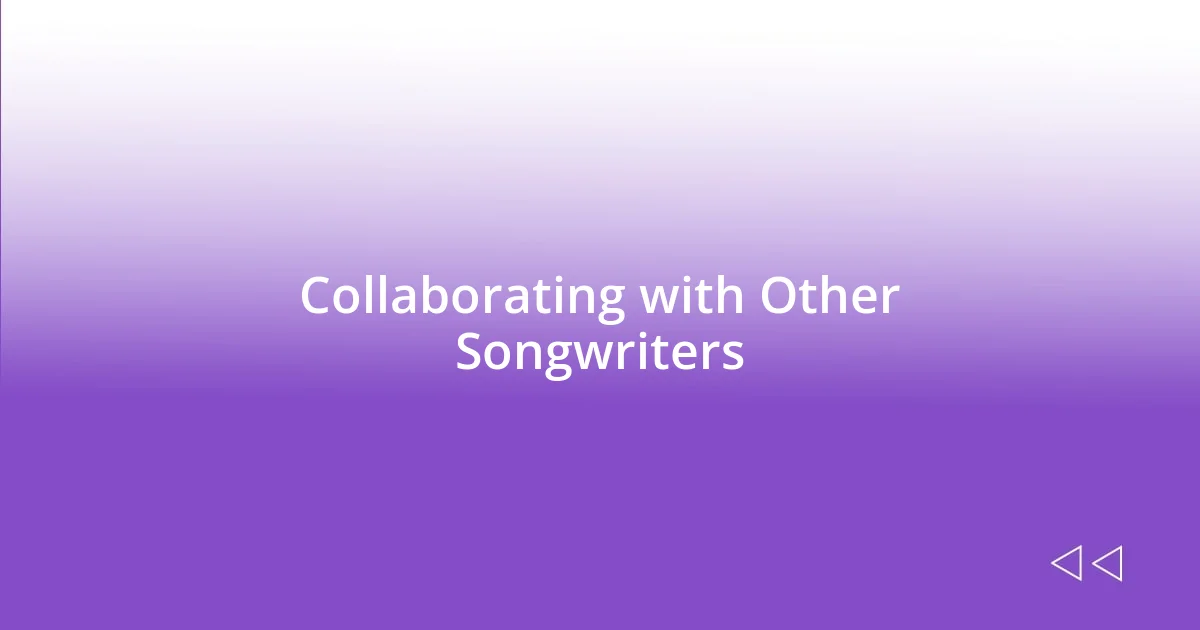
Collaborating with Other Songwriters
Collaborating with other songwriters has been a game changer for me. I remember my first co-writing session like it was yesterday. Sitting in a cozy studio, we tossed ideas back and forth. One songwriter suggested an angle I never considered, which opened up a new lyrical direction. Have you ever had a moment in collaboration that turned everything around?
There’s something magic about blending different perspectives. I once worked with a friend whose style was starkly different from mine—she loved metaphors, while I leaned toward straightforward narratives. As we pieced our ideas together, that contrast enriched our song, allowing us to create a layered experience that neither of us could achieve alone. How do you think varying styles affect the songwriting process?
Trusting your collaborator is essential, too. In another session, I felt vulnerable sharing my rough drafts; however, my co-writer’s encouragement transformed my hesitations into something beautiful. His constructive feedback not only bolstered my confidence but also refined the song into something both of us were proud of. Have you experienced that kind of growth through partnership?
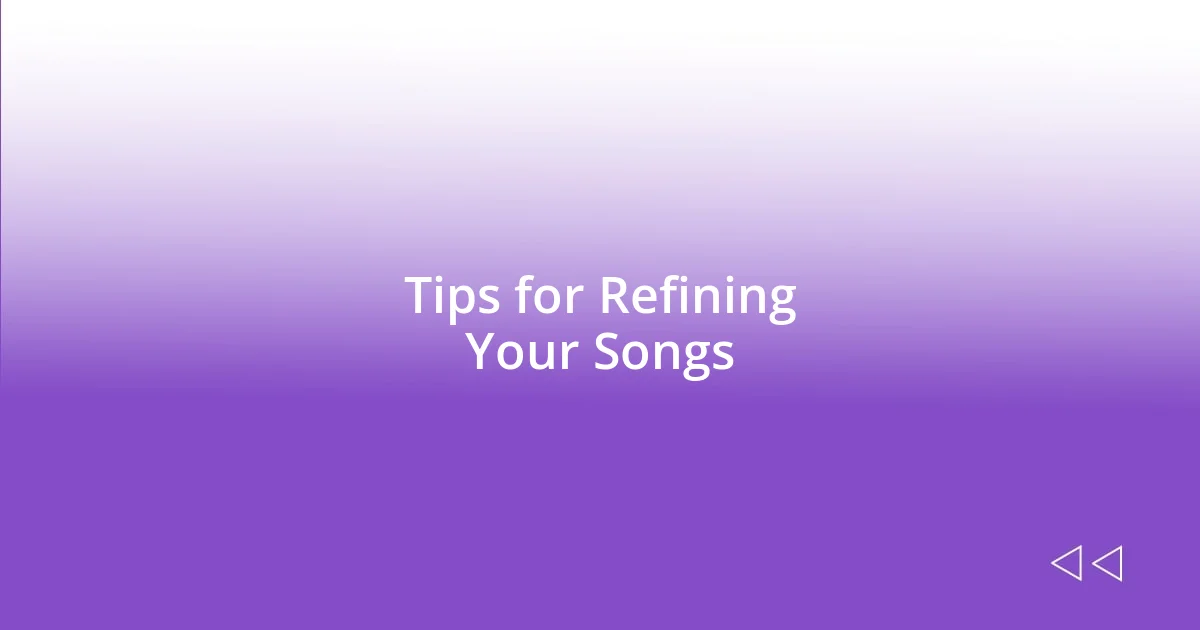
Tips for Refining Your Songs
Refining your songs can truly elevate them to new heights. One major tip I’ve discovered is to step back and listen to your song as if it’s being played for the first time. I once had a song that I thought was complete, but when I took a break and returned to it later, I realized the chorus was too long and lost its punch. That fresh perspective made all the difference. Have you ever experienced that moment of clarity after distancing yourself from your work?
Another method I find valuable is to seek feedback from trusted friends or fellow musicians. I remember sharing an early draft of a ballad with a few peers, and their insights peaked my awareness to certain lyrical ambiguities I had overlooked. Their constructive criticism challenged me to dig deeper and refine those parts, ultimately transforming the song. How do you approach gathering feedback from others?
Lastly, I make it a habit to revisit my lyrics multiple times, each time with a critical eye. On one occasion, a line I initially thought was clever struck me as cliché upon revisiting. By rephrasing it, I unlocked a more authentic expression of my thoughts. It’s fascinating how revisiting words can help shape a song into something unique. Have you found phrases in your own work that needed a second look and surprise you with their potential?
